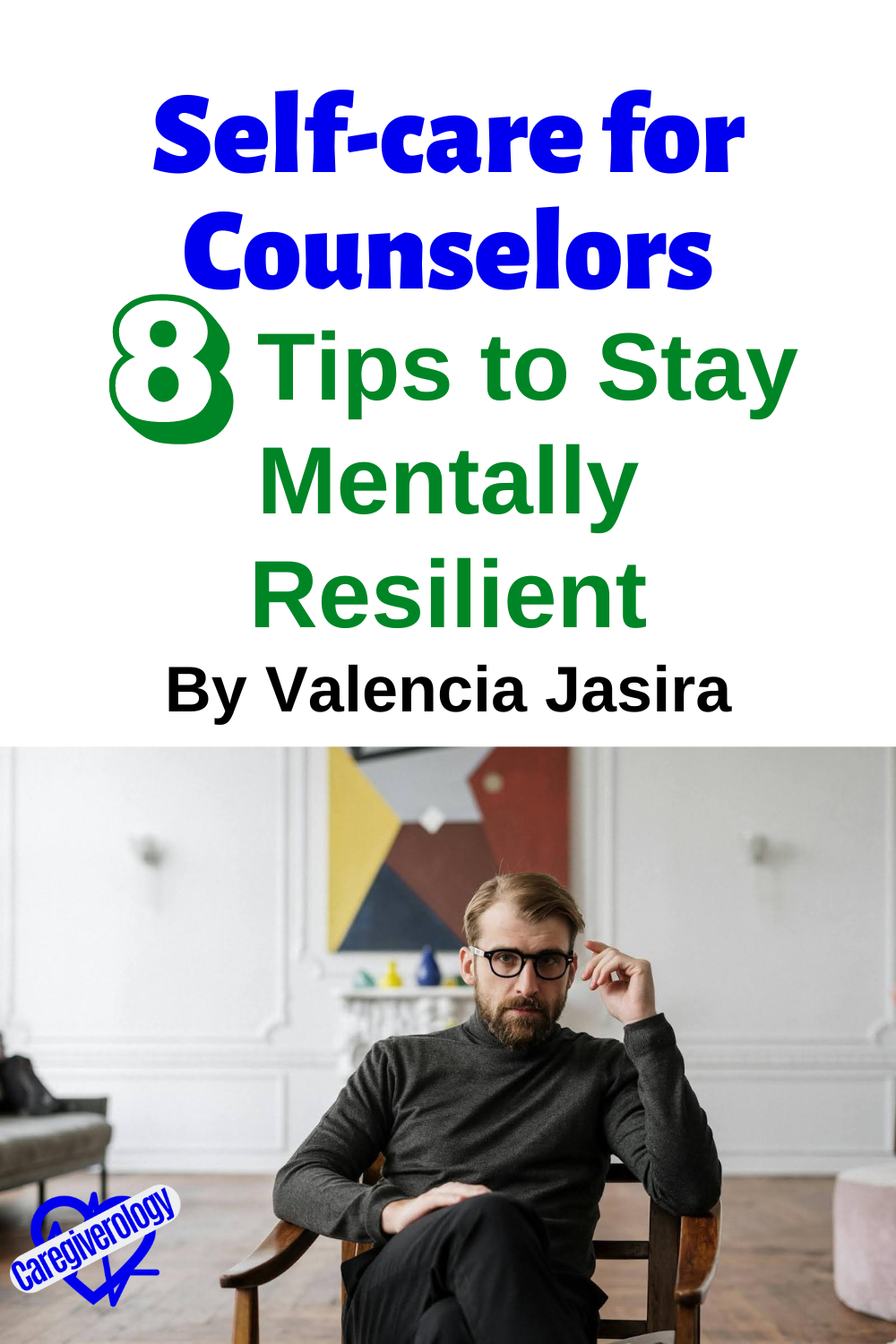Self-care for Counselors: Eight Tips to Stay Mentally Resilient

Counselors and therapists dedicate their lives to improving the mental health of their patients. Their work is demanding, often requiring deep emotional engagement and empathy. However, while helping others navigate their mental health challenges, counselors face their own risk of depression and burnout. The continuous exposure to their clients' struggles can take a toll on their own mental resilience, making it imperative for them to prioritize self-care. By adopting specific strategies tailored to their unique professional demands, counselors can maintain their mental health, ensuring they remain effective and compassionate in their roles.
Here are eight effective tips designed to help counselors stay mentally resilient.
1. Establish Boundaries
Setting clear boundaries between work and personal life is crucial for maintaining mental health. Counselors often engage deeply with their clients' issues, making it easy for work to spill over into their personal time. To prevent this, counselors should establish and maintain strict boundaries.
One way to establish boundaries is by designating specific work hours and adhering to them consistently. This means not taking work-related calls or responding to emails outside of these hours. Counselors should communicate these boundaries to their clients, colleagues, and family members to ensure everyone respects their personal time.
2. Pursue Continuing Education through Online Degrees
Continuing education is essential for counselors to stay updated with the latest techniques and theories in their field. However, attending in-person classes can be challenging, particularly for those who do not enjoy the flexibility that comes with a private practice. Online degrees offer a practical solution, allowing counselors to further their education without disrupting their professional lives.
Many advanced online degrees for counseling majors are now offered by credible institutions that provide the same quality education as on-campus programs. These online courses offer flexibility, enabling counselors to study at their own pace and schedule classes around their work commitments. This flexibility helps reduce stress and prevents burnout by allowing counselors to balance their professional and educational pursuits effectively.
3. Practice Regular Self-Reflection
This is something you might advise most of your clients, but do you practice it, too? Self-reflection is a powerful tool to maintain mental health. By regularly assessing their emotional and mental state, counselors can identify and address any issues before they escalate. This practice involves taking time to reflect on their experiences, feelings, and reactions to their work.
Counselors can incorporate self-reflection into their routines by setting aside time each day or week to engage in reflective practices. Journaling is a common method, allowing counselors to document their thoughts and feelings, which can provide insights into their mental state. Meditation is another effective technique, promoting mindfulness and helping counselors stay mentally healthy.
4. Seek Peer Support
Connecting with other counselors and therapists can provide invaluable support and a sense of community. Peer groups or professional networks offer a platform for counselors to share experiences, discuss challenges, and gain insights from others in similar roles. This support system can alleviate feelings of isolation and provide emotional support.
Attending regular meetings or participating in online forums can facilitate connections with other professionals. Engaging in peer supervision sessions, where counselors review cases and provide feedback to each other, can also be beneficial.
5. Utilize Supervision and Consultation
Regular supervision and consultation with experienced professionals are essential for maintaining mental resilience. These sessions provide counselors with guidance, support, and an opportunity to discuss difficult cases. Supervision helps counselors gain new perspectives, receive constructive feedback, and explore their personal reactions to their work.
Counselors should schedule regular sessions with a supervisor or mentor. These meetings can be held weekly or monthly, depending on the counselor's needs and availability. During these sessions, counselors can discuss challenging cases, seek advice, and reflect on their professional practice.
6. Engage in Hobbies and Interests
Engaging in hobbies and interests outside of work is vital for mental rejuvenation. These activities provide a break from work-related stress and allow counselors to relax and enjoy themselves. Hobbies can range from creative pursuits like painting or writing to outdoor activities such as hiking or gardening.
Counselors should make time for their hobbies by scheduling regular periods dedicated to these activities. This could be as simple as setting aside an hour each evening or dedicating weekends to personal interests. By doing so, they can create a balance between their professional and personal lives, which is essential for mental health.
Participating in hobbies not only provides a mental break but also fosters a sense of accomplishment and satisfaction. Whether it's learning a new skill or simply enjoying a favorite pastime, these activities contribute to overall well-being and help counselors maintain a positive outlook.
7. Set Realistic Expectations
Setting realistic expectations is crucial for counselors to avoid feelings of frustration and inadequacy. Recognizing that they cannot solve every problem or achieve perfect outcomes in every session helps manage stress and maintain a positive attitude.
This might involve focusing on incremental progress with clients rather than expecting immediate, drastic changes. By celebrating small successes and understanding that setbacks are a normal part of the process, counselors can maintain a balanced perspective.
Additionally, counselors should communicate these realistic expectations to their clients. Helping clients understand that progress may be gradual and that challenges are part of the journey can foster a supportive therapeutic relationship.
8. Take Regular Breaks and Vacations
Taking regular breaks throughout the workday and periodic vacations is crucial for preventing burnout. Short breaks during the day can help counselors recharge and maintain focus, while vacations provide an opportunity to fully disconnect and relax.
Counselors should schedule short breaks between sessions to rest and rejuvenate. This might involve stepping outside for a breath of fresh air, practicing a quick relaxation exercise, or simply taking a moment to stretch. These brief pauses can significantly improve mental clarity and reduce stress.
Planning regular vacations is equally important. Counselors should take time off to completely disconnect from work, allowing them to return refreshed and ready to support their clients. This could involve taking a few days off every few months or planning longer vacations annually. Ensuring that clients are aware of these breaks well in advance helps manage expectations and maintain continuity of care.
Self-care is a Necessity!
Counselors and therapists devote their lives to helping others navigate complex emotional landscapes, but this commitment often comes with some great personal challenges. Prioritizing self-care is not a luxury for these professionals; it is a necessity. These strategies not only enhance their capacity to support their clients but also ensure their own well-being is sustained. In a profession dedicated to mental health, taking steps to care for oneself is the cornerstone of sustained effectiveness and personal fulfillment. By integrating these self-care practices into their daily routines, counselors can continue to provide compassionate and effective care while safeguarding their own mental health.
Thank you Valencia Jasira for contributing this article.
Guest Articles Written for Caregiverology
From Self-care for Counselors to Home
Recent Articles
-
Common Truck Crash Injuries and Legal Remedies - Caregiverology
Jul 19, 25 10:49 AM
Known for its sun-drenched beaches, vibrant arts scene, and bustling maritime industry, Fort Lauderdale is a city that sees heavy traffic both on its roads and at its busy port. Unfortunately, with th… -
Why Expert Legal Help Matters After Serious Injury - Caregiverology
Jul 19, 25 10:35 AM
In Houston, over 67,600 car crashes occurred in 2023, resulting in 290 fatalities and 1,612 serious injuries. That’s roughly 185 accidents every day. -
How Life Care Planners Support Injury Recovery - Caregiverology
Jul 19, 25 10:18 AM
In Los Angeles, life care planners play a vital role in supporting injury recovery, especially for individuals facing catastrophic injuries such as traumatic brain injuries or spinal cord damage.





New! Comments
Have something to say about what you just read? Leave a comment in the box below.